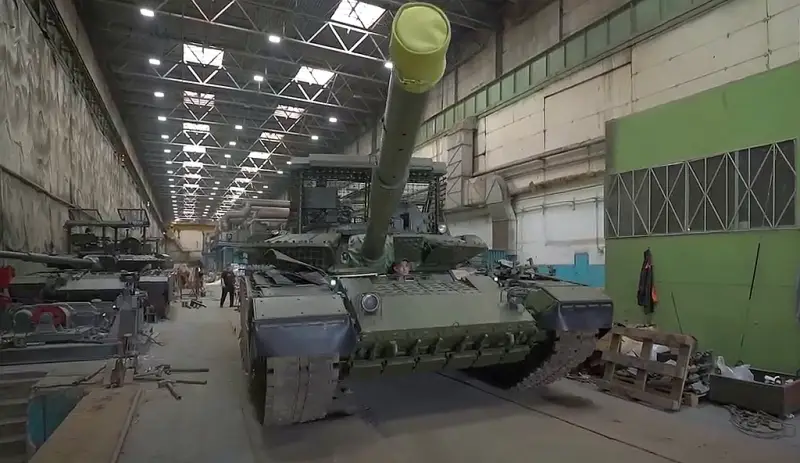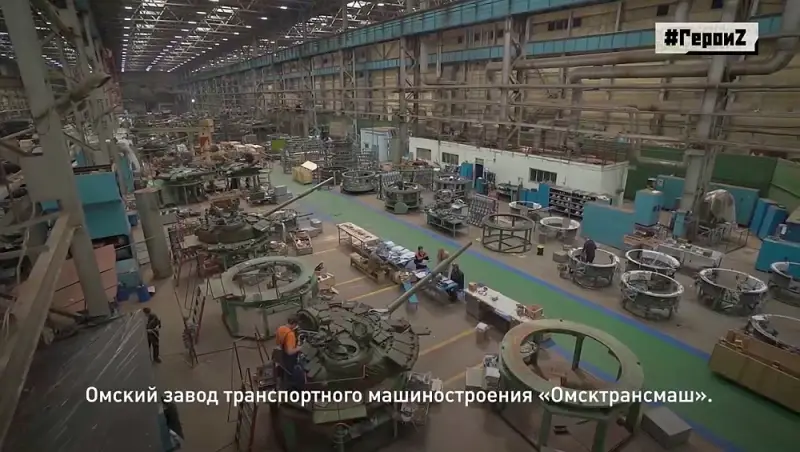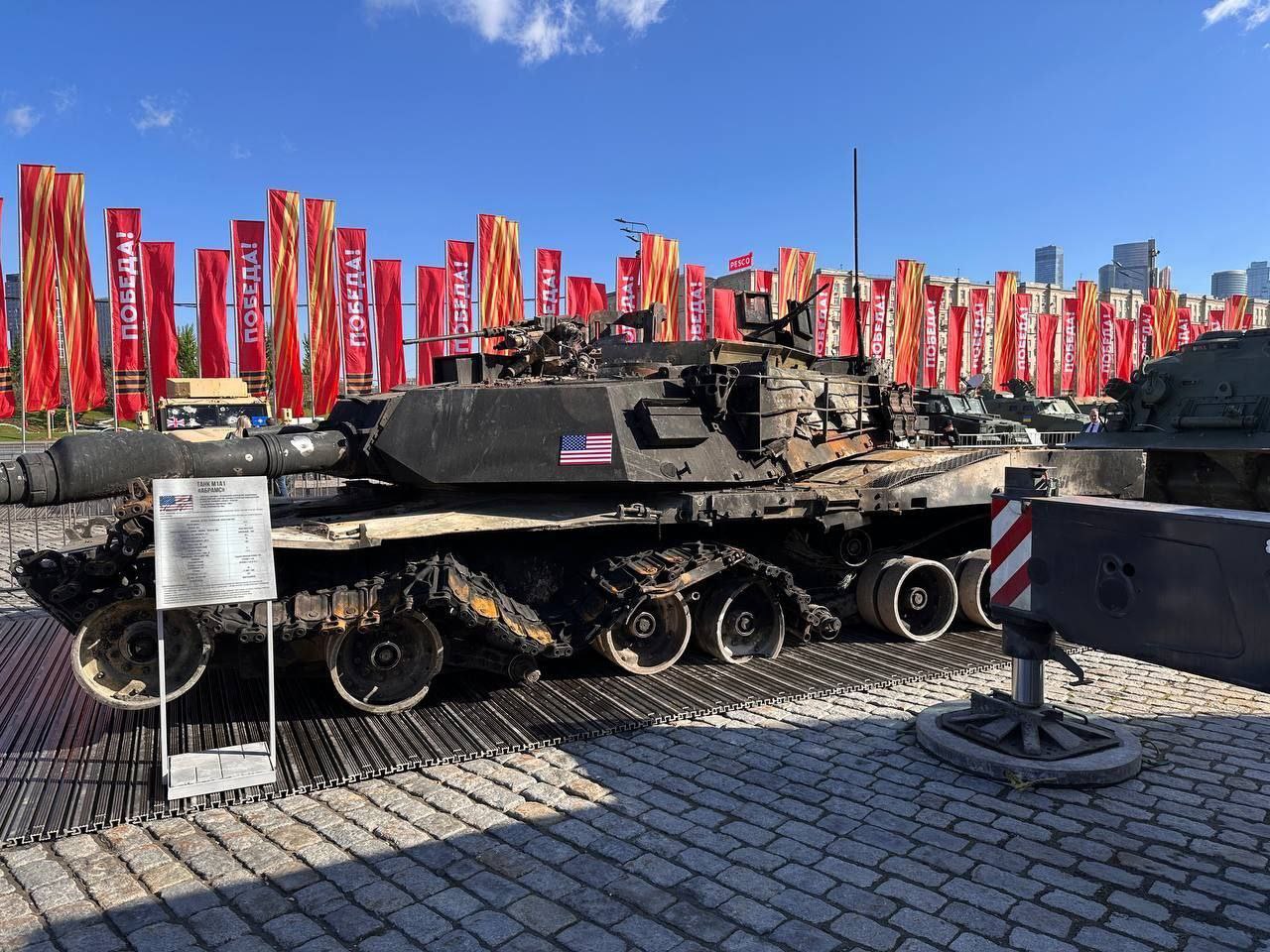Russia’s state-owned Rostec corporation has asserted that its T-80BVM tanks are virtually invulnerable to drone attacks featuring cumulative warheads, attributing this to the tanks’ extensive protective enhancements.
The T-80BVM tanks, produced by Omsktransmash, a division of the Uralvagonzavod concern and a subsidiary of Rostec, are distinguished by their comprehensive array of protective features.
These include mesh screens and nets designed to shield the engine compartment and the rear turret area from cumulative grenades, guided missiles, and first-person view (FPV) drones.
In addition to these features, recent upgrades have seen the installation of a module designed to protect the upper turret, known colloquially as the “barbecue.”
According to Rostec, the T-80BVM’s protective measures are designed to provide near-complete coverage from all angles.

The tanks are equipped with an array of defensive features, including a specialized “barbecue” module that shields the upper turret and double side screens with active protective elements that guard the fenders.
The tank’s frontal hull and turret are described as “completely indestructible,” while the “Cape” system further diminishes the tank’s thermal, radar, and visual signatures.
Rostec explained that these advancements are a direct response to combat experiences. The corporation pointed out that the current level of protection on Russian tanks leaves minimal vulnerabilities that drones carrying cumulative warheads could exploit.
“As a result, domestic vehicles have almost no weak points where they can be hit by a drone carrying a cumulative warhead, which cannot be said about the tanks of the Armed Forces of Ukraine, especially Western ones,” Rostec said.
The tanks also benefit from unbreakable idler protection and dynamic armor that triggers explosive charges at a distance from the main armor, thereby preserving the vehicle’s integrity during explosions.
Rostec’s statements emphasize the continuous efforts to advance tank defense systems in response to contemporary warfare challenges, demonstrating Russia’s dedication to bolstering the resilience of its armored vehicles.
Superior Protection Compared To Western Tanks?
The ongoing conflict has demonstrated that even small-sized FPV drones can severely damage armored vehicles, a threat both sides have faced in the Russian-Ukrainian war.
In fact, despite their reputation for advanced capabilities, American Abrams and Bradleys, German Leopards, and Russia’s T-90M have demonstrated susceptibility to strikes from low-cost, one-way drones.
These relatively low-cost drones, often priced at just a few hundred dollars, have disabled high-end armored vehicles valued in the millions.
During the early phase of the war, such incidents were rare and surprising, but they have now become a regular feature of modern warfare. To counter these threats, many tanks are now equipped with large, welded “cope cages” designed to deflect or withstand drone attacks.
While early versions of these protective structures seemed crude and offered limited effectiveness, more recent iterations have been improved, featuring stronger and more sophisticated designs to provide enhanced defense against these low-cost yet dangerous threats.

These experiences have allowed Russian defense manufacturers to enhance the protection of their tanks. Rostec claimed that the upgraded T-80BVM offers superior defense compared to all Ukrainian tanks, including those supplied by Western allies.
Furthermore, unlike the earlier makeshift solutions that were hastily welded onto the tank’s hull and turret in frontline repair workshops or even by soldiers directly on the battlefield, factory-produced versions of this protective gear offer several key advantages.
These include a more robust and reinforced design and, crucially, the ability to allow the crew to evacuate safely if the tank is compromised.
According to Russian media, the modernization of Soviet-era T-80 tanks at Omsktransmash started several years before the current conflict. Since February 2022, the facility has significantly ramped up production and is operating around the clock.
Earlier, Rostec challenged the notion of Western military technology superiority, specifically regarding the Abrams tank.
Sergey Chemezov, Rostec’s general director, criticized the myth of Western technological dominance, pointing out that many Western tanks, such as Leopards, Challengers, and Bradleys, have been damaged or destroyed on the battlefield as evidence of Russian capabilities.

Rostec also addressed the destruction of an Abrams tank, dismissing the belief in its invincibility. They highlighted that the T-80, being smaller and more agile than the Abrams, offers a better power-to-weight ratio and is equipped with a larger caliber gun.
The T-80BVM features a powerful gas turbine engine, which enhances its off-road performance in extreme conditions.
It also boasts new and improved features, including a modern communication system with a range of up to ten kilometers, enhanced protection, and additional armor modules designed to withstand attacks from FPV drones, anti-tank guided missiles (ATGMs), and rocket-propelled grenades (RPGs).
- Contact the author at ashishmichel(at)gmail.com
- Follow EurAsian Times on Google News




